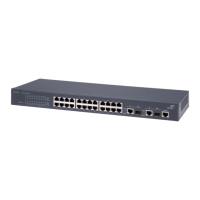1-3
z If you expect that 10 Mbps and 1000 Mbps are the available auto-negotiation speeds of the port,
you just need to configure speed auto 10 1000.
Follow these steps to configure auto-negotiation speeds for a port:
To do... Use the command... Remarks
Enter system view
system-view
—
Enter Ethernet interface
view
interface interface-type
interface-number
—
Configure the available
auto-negotiation speed(s)
for the port
speed auto [ 10 | 100 |
1000 ]*
Optional
By default, the port speed is
determined through auto-negotiation.
z After you configure auto-negotiation speed(s) for a port, if you execute the undo speed command
or the speed auto command, the auto-negotiation speed setting of the port restores to the default
setting.
z The effect of executing speed auto 10 100 1000 equals to that of executing speed auto, that is,
the port is configured to support all the auto-negotiation speeds: 10 Mbps, 100 Mbps, and 1000
Mbps.
Limiting Traffic on individual Ports
By performing the following configurations, you can limit the incoming broadcast/ unknown
multicast/unknown unicast traffic on individual ports. When a type of incoming traffic exceeds the
threshold you set, the system drops the packets exceeding the traffic limit to reduce the traffic ratio of
this type to the reasonable range, so as to keep normal network service.
Table 1-3 Limit traffic on port
Operation Command Remarks
Enter system view
system-view
—
Limit broadcast traffic received
on each port
broadcast-suppression ratio
Optional
By default, the switch does not
suppress broadcast traffic.
Enter Ethernet port view
interface interface-type
interface-number
—
Limit broadcast traffic received
on the current port
broadcast-suppression { ratio
| bps max-bps }
Optional
By default, the switch does not
suppress broadcast traffic.

